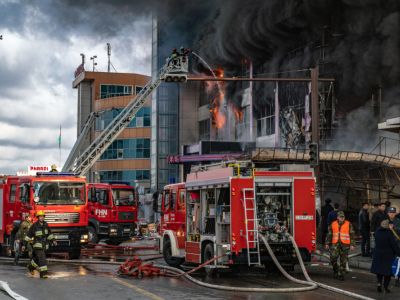By Mahmoud Al Abed
English News Editor
Few would dispute the fact that United States allies in the Middle East, particularly Egypt, Saudi Arabia and Jordan, have done a good job of fighting terrorism, particularly so-called Islamic terrorism.
So what’s new about these countries' recent declarations of support for US President George Bush, who has called for an international anti-terrorism coalition after the deadly attacks on his country by alleged Muslim terrorists?
Evidently, the hasty response by Riyadh, Cairo and Amman, among other regional players, was spurred by the magnitude of the terrorist attacks and the resulting state of shock. The declarations of support are in many ways unsurprising, given, first of all, that these Arab countries are not safe from terrorism themselves. There is also the alleged involvement of Arabs and Muslims in the attacks to prompt a quick response. But most importantly, they have been given little choice.
The New York Times reported on Friday that a senior US State Department official met with 15 Arab representatives and gave them a stark choice: either declare their nations members of the international coalition against terrorism, or risk being isolated in a growing global conflict.
Convincing potential allies to come to the table is one thing. But when the dust settles, and the coalition partners sit down to talk business, they need to give a crystal-clear definition of “terrorist groups.”
For its part, Egypt has had no problem with eliminating traces of the Jihad group and Gamaa Islamiyya, which it has successfully nailed down. Gamaa has dropped its guns, and the Jihad appears to be history - to a satisfactory degree.
Saudi Arabia, meanwhile, is ready to behead all those involved in terrorist attacks in Khobar and Riyadh, and the Shiite minority in the kingdom is being taken care of.
Jordan has cracked down on and eliminated several groups -Jaish Mohammad, Al Nafeer, Baiat Al Imam - and finally the Qaeda, or base, a radical Islamist group linked to Osama bin Laden.
But the issue does not end there.
As put by Jordanian Foreign Minister Abdulillah Khatib: “We agree that this is an attack against us all…but we will need to exert efforts to draw lines between the issues of terrorism and the struggle for independence on the part of different people. It is not an easy thing.”
This line should be drawn between Qaeda, for example, and the Muslim Brotherhood, in Jordan and Egypt, which has denounced the attacks and extended condolences to the American people.
Then there is the thorny question of nationalist movements, especially those involved in the latest Palestinian uprising against 34 years of Israeli military occupation.
Groups like Hamas, the Popular Front for the Liberation of Palestine (PFLP), and the Democratic Front for the Liberation of Palestine (DFLP) - as well as their Lebanese counterpart, Hizbollah - are national resistance movements as far as the Arab states and most of the world are concerned. But the US does not share this definition.
Will Syria be punished if it does not stop its support for Hizbollah? Will Jordan be asked to clamp down on the Muslim Brotherhood if Washington decides that they are terrorists or pro-terrorists?
There are more questions awaiting an answer from the would-be founders of the international coalition. Will Saudi Arabia be pressed to cut all ties with Iran and other so-called Arab "rogue states" or terrorism sponsors?
What will happen to Libya and Sudan?
In other words, what is Bush up to?
Reports quote regional analysts and government officials as saying that there may be limits to what Arab states can or are willing to do on America’s behalf at a time when shock over the attacks is offset by anger over American support for Israel and what is seen as unjust punishment of Iraq.
Even as they pledged help in figuring out what happened in New York and Washington this week, regional allies stopped short of commitments to future military action. This is, they noted, different from the 1990 Iraqi invasion of Kuwait, which threatened the sovereignty of an Arab nation and prompted Egypt, Saudi Arabia and even Syria to join a coalition to repel the Iraqi army.
While Afghanistan’s Taliban government is not popular among most Arab states, it could be difficult for Arab forces to join in any US-led military action against another Muslim state, the reports add.
This is particularly true at a time when Arabs feel the United States has ignored their pleas for help in stopping what they see as unjust use of US-supplied weaponry by Israel in Gaza and the West Bank.
In the face of such rifts, Washington will have to heed Egyptian President Hosni Mubarak and other allies, who have advised the US against distancing itself from the Middle East conflict and continuing its bias in favor of the Israelis.
The future of the region is a mystery in this respect, but one fact remains: the world will never be the same after September 11.
© 2001 Al Bawaba (www.albawaba.com)









